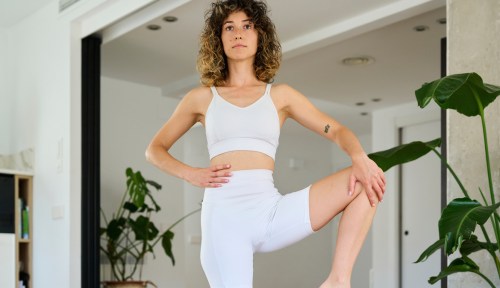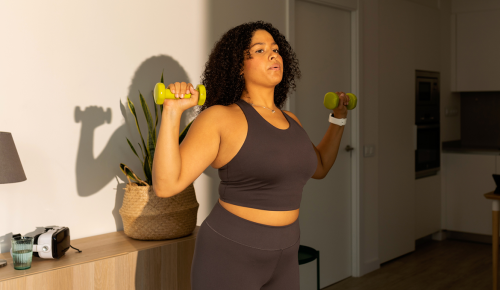Stretching is an important element to any workout routine and will help prevent injury, loosen up tight muscles, improve your flexibility, and relieve soreness. But sometimes, weird things can happen when you’re getting deep and having some personal time with your body, like feeling muscle tingling while you’re stretching. Should you be concerned?
Experts in This Article
physical therapist based in Southern California
board-certified sports specialist and physical therapist based in San Francisco
“Numbness and tingling can come from a number of different things, but it’s important to know that it’s very common to have those sensations, especially when we’re stretching,” says physical therapist Jacob VanDenMeerendonk, DPT.“It’s actually to be expected, especially if you’re trying to elongate or improve your mobility, you’re going to experience some of the symptoms just like you experience fatigue or soreness after an exercise.”
The tingling sensation may seem unusual to you, but Leada Malek, PT, DPT, CSCS, SCS, a board-certified sports specialist in San Francisco, says it usually isn’t a reason to worry.
“I wouldn’t call it a concern unless it’s especially uncomfortable or the tingling persists for more than a few minutes or causes an ache after the fact,” Dr. Malek says.
Why do my muscles tingle when I stretch?
Tingling can happen for a variety of different reasons. But the basic explanation is that your muscles, tendons, fascia, and even your nerves are all impacted by stretching.
“When we’re trying to stretch any tissue in the body, we’re not just stretching the muscle, we’re stretching the nerves,” says Dr. VanDenMeerendonk. “We’re stretching the network of nerves that surround that muscle tissue that intertwine within the fascial tissue. And so inevitably we’re going to either irritate those nerves or we’re going to wake them up and make them talk to us at some point.” That communication could come in the form of tingling.
Can tingling occur in parts of the body that you’re not actively stretching?
It’s also normal to feel tingling in the feet when stretching the hamstring, tingling in the hands when stretching the arms, or essentially feeling tingling or numbness in other parts of the body that aren’t directly what you’re stretching. That’s because nerves often run through multiple muscle systems. So stretching your shoulder means you’re stretching the nerve that also ends up in your hands—the median nerve—and that tingling sensation can occur anywhere on the nerve. Stretching your hamstrings results in a stretch to the sciatic nerve, which goes all the way down to your feet.
Other reasons for muscle tingling during stretching
Beyond the fact that stretching your muscles means you’re also stretching your nerves, there are some additional factors that could contribute to tingling.
Tight muscles
What we perceive as tight muscles could exacerbate this problem since Dr. VanDenMeerendonk says scientists are increasingly coming to understand tight muscles as an issue of the nervous system not allowing the muscles to elongate rather than a problem with the muscle’s ability to lengthen and shorten itself.
“It’s usually the nervous system that’s preventing the muscle from elongating,” Dr. VanDenMeerendonk says. “You’re not used to being in those positions. And so the nervous system is what’s usually causing you to feel that sensation of tension.”
Nerve irritation or compression
Another possibility is nerve irritation from a wonky position, injury, or overuse. That could lead to oversensitiveness of the nerve as you stretch, and “the sensitivity to the stress could come on due to limb positioning, holding the stretch for too long, or the irritated nerve itself,” Dr. Malek says. Especially if you’ve got nerve tingling in the feet, that could be a sign of stress from a high-impact repetitive motion like running.
Dehydration
Insufficient hydration and electrolyte levels can mess up communication channels, so tingling from stretching could be a sign that you’re dehydrated.
What about numbness?
Numbness or feeling like your feet or limbs are falling asleep is a feeling related to tingling since they both come from nerve compression. Everything from tight shoes to clenched fists can bring this on. Restore blood flow by shaking out the effective limbs.
What should you do if you feel muscle tingling during stretching?
While muscle tingling from all types of stretches is normal, it could be a sign that you’re not necessarily getting the most out of your stretch. “Stretches should be felt in the muscles for the best outcome, so if there’s tingling, it may be a good idea to modify the stretch,” says Dr. Malek. You don’t want tingling to impede your muscle work, after all.
It’s also a good idea to take a less extreme version of the stretch, or to leave that muscle group alone for a little while, to prevent further discomfort or injury.
If you stretch an already irritated nerve, it can “light up symptoms into the next 24 hours and could include muscle tightness, aching, some pain, or numbness and tingling,” Dr. Malek says. If that happens, she recommends making note of the stretch and the position that caused the discomfort and modifying it once the symptoms settle and you stretch that muscle group again.
How to relieve muscles tingling from stretching
If you do feel tingling, Dr. Malek recommends modifying the stretch in order for it to feel more comfortable. Essentially, back off on the intensity until the tingling goes away.
Another way to avoid tingling as you stretch is to add a soft bend to the joint of the muscle you’re stretching, adjust your posture, or not go as deep into the stretch or hold it for as long. “For example, with a straight-leg hamstring stretch, you’d want to make sure you have a straight back and spine and stop before tingling, or add a soft bend in the knee if that’s already a deep stretch,” she advises.
When to get help
A sustained tingling sensation is a sign that you should consult a medical professional.
“Numbness and tingling is a normal sensation of the body as long as it’s just coming and going every once in a while,” Dr. VanDenMeerendonk says. “If you’re experiencing the numbness and tingling, and it’s not going away after say 10, 15 minutes after you’ve performed the exercise or the stretch, that’s something that you want to probably get checked out by physical therapist to go to your MD just to see if there’s any other underlying causes for it, especially if it’s longer than that.”
As a general rule, you should never experience pain as you stretch. If you do, consult your primary care physician or a physical therapist to discuss your symptoms and develop a treatment plan to reduce and alleviate any pain you may be experiencing.
Got tight muscles? This 20-minute full-body stretch routine is *exactly* what you need:
Sign Up for Our Daily Newsletter
Get all the latest in wellness, trends, food, fitness, beauty, and more delivered right to your inbox.
Got it, you've been added to our email list.











